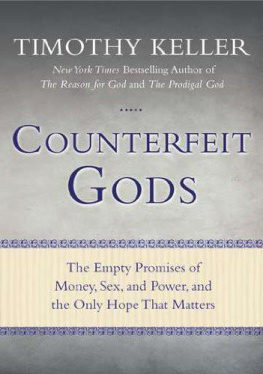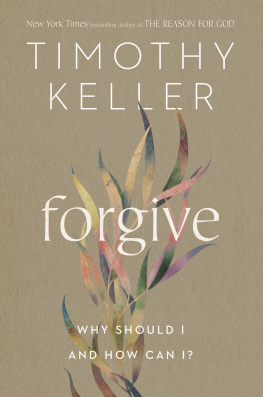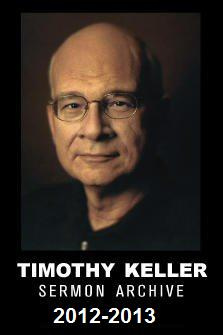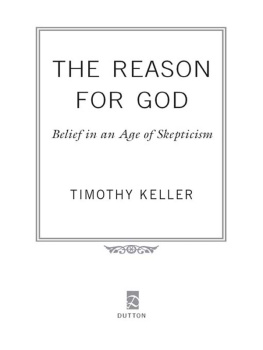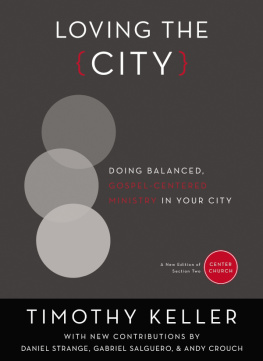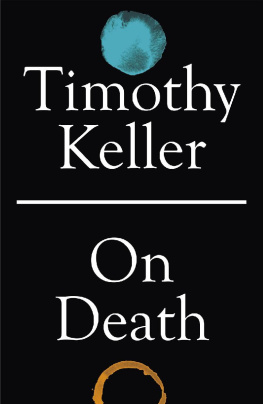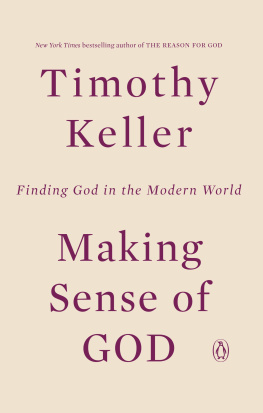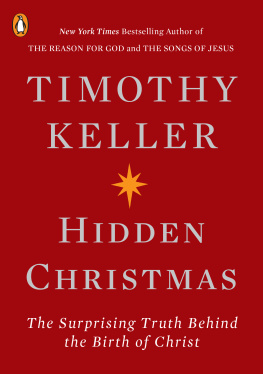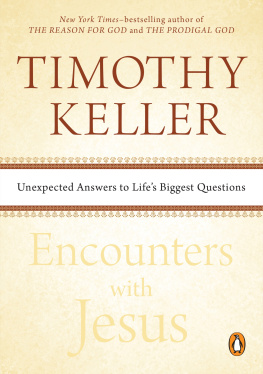Table of Contents
ALSO BY TIMOTHY KELLER
The Reason for God:
Belief in an Age of Skepticism
The Prodigal God:
Recovering the Heart of the Christian Faith

DUTTON
Published by Penguin Group (U.S.A) Inc.
375 Hudson Street, New York, New York 10014, U.S.A.
Penguin Group (Canada), 90 Eglinton Avenue East, Suite 700, Toronto, On
tario M4P 2Y3, Canada (a division of Pearson Penguin Canada Inc.); Penguin
Books Ltd, 80 Strand, London WC2R 0RL, England; Penguin Ireland, 25 St
Stephens Green, Dublin 2, Ireland (a division of Penguin Books Ltd); Penguin
Group (Australia), 250 Camberwell Road, Camberwell, Victoria 3124, Australia
(a division of Pearson Australia Group Pty Ltd); Penguin Books India Pvt Ltd,
11 Community Centre, Panchsheel Park, New Delhi110 017, India; Penguin
Group (NZ), 67 Apollo Drive, Rosedale, North Shore 0632, New Zealand (a
division of Pearson New Zealand Ltd); Penguin Books (South Africa) (Pty) Ltd,
24 Sturdee Avenue, Rosebank, Johannesburg 2196, South Africa
Penguin Books Ltd, Registered Offices: 80 Strand, London WC2R 0RL,
England
Published by Dutton, a member of Penguin Group (U.S.A) Inc.
First printing, October 2009
Copyright 2009 by Timothy Keller
All rights reserved
REGISTERED TRADEMARKMARCA REGISTRADA
LIBRARY OF CONGRESS CATALOGING-IN-PUBLICATION DATA
Keller, Timothy J., 1950
Counterfeit gods : the empty promises of money, sex, and power, and the only
hope that matters / Timothy Keller.
p. cm.
eISBN : 978-1-101-14887-7
Without limiting the rights under copyright reserved above, no part of this publication may be reproduced, stored in or introduced into a retrieval system, or transmitted, in any form, or by any means (electronic, mechanical, photocopying, recording, or otherwise), without the prior written permission of both the copyright owner and the above publisher of this book.
The scanning, uploading, and distribution of this book via the Internet or via any other means without the permission of the publisher is illegal and punishable by law. Please purchase only authorized electronic editions, and do not participate in or encourage electronic piracy of copyrighted materials. Your support of the authors rights is appreciated.
While the author has made every effort to provide accurate telephone numbers and Internet addresses at the time of publication, neither the publisher nor the author assumes any responsibility for errors, or for changes that occur after publication. Further, the publisher does not have any control over and does not assume any responsibility for author or third-party Web sites or their content.
http://us.penguingroup.com
To my sons,
David, Michael, and Jonathan,
who can detect the counterfeit
INTRODUCTION THE IDOL FACTORY
There are more idols in the world than there are realities.
Friedrich Nietzsche, Twilight of the Idols
A Strange Melancholy
A fter the global economic crisis began in mid- 2008, there followed a tragic string of suicides of formerly wealthy and well-connected individuals. The acting chief financial officer of Freddie Mac, the Federal Home Loan Mortgage Corporation, hanged himself in his basement. The chief executive of Shel don Good, a leading U.S. real estate auction firm, shot himself in the head behind the wheel of his red Jaguar. A French money manager who invested the wealth of many of Europes royal and leading families, and who had lost $1.4 billion of his clients money in Bernard Madoffs Ponzi scheme, slit his wrists and died in his Madison Avenue office. A Danish senior executive with HSBC Bank hanged himself in the wardrobe of his 500-a-night suite in Knightsbridge, London. When a Bear Stearns executive learned that he would not be hired by JPMorgan Chase, which had bought his collapsed firm, he took a drug overdose and leapt from the twenty-ninth floor of his office building. A friend said, This Bear Stearns thing... broke his spirit. It was grimly reminiscent of the suicides in the wake of the 1929 stock market crash.
In the 1830s, when Alexis de Tocqueville recorded his famous observations on America, he noted a strange melancholy that haunts the inhabitants... in the midst of abundance. This strange melancholy manifests itself in many ways, but always leads to the same despair of not finding what is sought.
There is a difference between sorrow and despair. Sorrow is pain for which there are sources of consolation. Sorrow comes from losing one good thing among others, so that, if you experience a career reversal, you can find comfort in your family to get you through it. Despair, however, is inconsolable, because it comes from losing an ultimate thing. When you lose the ultimate source of your meaning or hope, there are no alternative sources to turn to. It breaks your spirit.
What is the cause of this strange melancholy that permeates our society even during boom times of frenetic activity, and which turns to outright despair when prosperity diminishes? De Tocqueville says it comes from taking some incomplete joy of this world and building your entire life on it. That is the definition of idolatry.
A Culture Filled with Idols
To contemporary people the word idolatry conjures up pictures of primitive people bowing down before statues. The biblical book of Acts in the New Testament contains vivid descriptions of the cultures of the ancient Greco-Roman world. Each city worshipped its favorite deities and built shrines around their images for worship. When Paul went to Athens he saw that it was literally filled with images of these divinities (Acts 17:16). The Parthenon of Athena overshadowed everything, but other deities were represented in every public space. There was Aphrodite, the goddess of beauty; Ares, the god of war; Artemis, the goddess of fertility and wealth; Hephaestus, the god of craftsmanship.
Our contemporary society is not fundamentally different from these ancient ones. Each culture is dominated by its own set of idols. Each has its priesthoods, its totems and rituals. Each one has its shrineswhether office towers, spas and gyms, studios, or stadiumswhere sacrifices must be made in order to procure the blessings of the good life and ward off disaster. What are the gods of beauty, power, money, and achievement but these same things that have assumed mythic proportions in our individual lives and in our society? We may not physically kneel before the statue of Aphrodite, but many young women today are driven into depression and eating disorders by an obsessive concern over their body image. We may not actually burn incense to Artemis, but when money and career are raised to cosmic proportions, we perform a kind of child sacrifice, neglecting family and community to achieve a higher place in business and gain more wealth and prestige.
After New Yorks governor Eliot Spitzer destroyed his career because of his involvement in a high-priced prostitution ring, David Brooks noted how our culture has produced a class of high achievers with rank-link imbalances. They have social skills for vertical relationships, for improving their rank with mentors and bosses, but none for genuine bonding in horizontal relationships with spouses, friends, and family. Countless presidential candidates say they are running on behalf of their families, even though their entire lives have been spent on the campaign trail away from their families. As the years go by they come to the sickening realization that their grandeur is not enough and that they are lonely. Many of their children and spouses are alienated from them. They seek to heal the hurt. They get into affairs or take other desperate measures to medicate the inner emptiness. Then comes family breakdown or scandal or both.
Next page
